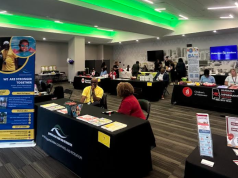
By John Sharp | jsharp@al.com
Africatown Hall & Food bank began welcoming food deliveries Tuesday morning, less than two weeks after the $2.4 million venue was officially opened.
Houses are under construction, and plans are still underway to build a Welcome Center near the Old Plateau Cemetery. And within the cemetery, archeologists and community volunteers are documenting gravesites in a first-of-its-kind effort to improve historical recordkeeping.
It’s business as usual for one of the most historic communities in Alabama, despite its origins called into question this past weekend. The Wall Street Journal, in a piece published Saturday, asked the question on whether the Clotilda story was a hoax.
According to journalist and author Erik Calonius, the story of the 110 enslaved Africans who were smuggled into Mobile 164 years ago, was a “fairy tale” and should be re-examined by historians and others.
“We are in a season right now in our country where certain kinds of history are being suppressed,” Mobile County Commissioner Merceria Ludgood, whose commission district includes Africatown and who has been a chief supporter for redeveloping the community since the hull of the Clotilda was discovered in 2019.
“The reality is until this country reckons with its history as a slave holding nation, we’ll never make the kind of strides we need to make,” said Ludgood. “You got to own your problem. You have to call it for what it is and begin the healing process. We have been reluctant to do that.”
Ludgood’s comment came on the same day that the county commission, in a unanimous vote, approved a 10-year lease agreement with the Africatown Community Development Corp. (ACDC) to lease approximately 2,664 square feet of Africatown Hall for the use of a food distribution center.
The lease is for only a portion of the building; the other half of the building will be leased to the Africatown Redevelopment Corp. (ARC), which is focused on improving housing within the community that is approximately six miles north of downtown Mobile. A lease agreement with ARC is expected to be approved within the next month.
“Starving For Investment”
“For Africatown, whether there was a Clotilda or not, it’s a community that is starving for investment,” Ludgood said. “It needs as much help as it can get. My commitment is to that community and the people who live there, irrespective of the Clotilda.”
Karlos Finley, executive director of ARC, said organizers with the Dora Franklin Finley African-American Trail have been dealing with 25 years of people doubting history related to the community, despite the documentations through descendants and manifestos.
“We’re really not looking to give attention to what I think are ancillary opinions,” Finley said. “We have too much work to do.”
Indeed, that work includes the redevelopment of four properties on Susie Ansley and Green streets, which he said offers “unique possibilities” that include new residential housing or the potential for commercial use.
He said ARC is working on a master plan for the neighborhood that will be the subject of a retreat next month.
“We will know more after that,” he said.
ARC was formed through state legislation in 2021 and is focused on utilizing approximately $3 million in American Rescue Plan Act funds to build new housing. Two of those houses have been wrapped up – at 1121 Newman Lane and 812 Susie Ansley St.
Finley said in May that ARC needs to have the ARPA money spent before December 2026. He also said at the time that ARC is looking to build 15 houses within Africatown, with much of that work occurring along Edwards Street after the organization acquired nine properties near the Robert L. Hope Community Center.
“The community has such positive energy about it now and we’re not really looking to address anything from a negative perspective,” Finley said. “There is just so much good going on.”
“Not About The Ship”
Jeremy Ellis, president of the Clotilda Descendant’s Association, said his group believes any focus or attention about the story about the slave ship should focus on the “survivors, their descendants or the communities where the survivors lived such as Africatown, Dallas County, Gee’s Bend, etc.”
Said Ellis, in a statement, “It is not about the ship, it is about the people on the ship, their descendants and their communities and that is where our focus will continue to remain.”
Africatown, in the aftermath of the Clotilda discovery in May 2019, has seen a surge of national media attention and interest. It culminated in the opening last year of the $1.3 million Africatown Heritage House, a small museum that became known as one of the top new museums in the U.S.
The developments are meant as a way to tell the story of the Clotilda that, according to Calonius, never occurred and might have been part of a hoax planted by proslavery agitators aimed to humiliate the federal government ahead of the Civil War in 1860s.
Calonius points to the 1858 arrival in Georgia of another slave ship, the Wanderer – which he writes about in a book published in 2008 – as being the last slave ship to enter the U.S., and one that “sparked uproar and extensive newspaper coverage” at the time, as opposed to the Clotilda. Calonius believes the African-born people in post-Civil War Mobile likely came from the Wanderer, according to the Wall Street Journal story.
“I believe the timing of the article and the attempt is essentially to undermine history,” Ellis said, noting it was published ahead of the anniversary of the Clotilda’s arrival into Mobile Bay. He also called it an attempt by the “far-right” political movement in the U.S. to undermine Black history.
“It’s unfortunate this type of article would be written and published at this time, and at a time when history is attempted to be rewritten,” he said.




